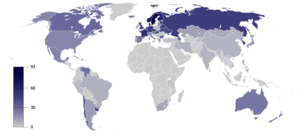Phil Zuckerman - Wikipedia
Published work[edit]

Phil Zuckerman's analysis finds differing levels of atheists and agnostics in countries around the world[15]
Phil Zuckerman is the author of six books, including The Nonreligious[16], co-authored with Luke Galen and Frank Pasquale; Living the Secular Life;[17] Faith No More;[18] Society without God;[19] Invitation to the Sociology of Religion;[20]and Strife in the Sanctuary.[21] His works have been translated into six languages, including Persian, Korean and Turkish.[22]
Phil Zuckerman's 2008 book Society without God notes that Denmark and Sweden, "probably the least religious countries in the world, and possibly in the history of the world", enjoy "among the lowest violent crime rates in the world [and] the lowest levels of corruption in the world".[23] Zuckerman identifies that Scandinavians have "relatively high rates of petty crime and burglary", but "their overall rates of violent crime—such as murder, aggravated assault, and rape—are among the lowest on earth".[24] In 2009, New York Times columnist Peter Steinfelscommented that Society Without God provides evidence that an irreligious society can flourish.[25] Society Without God won a “Book of the Year Silver Award” by Foreword Magazine in 2008[26] and was featured in The New York Times in an article by Peter Steinfel.[27]
Zuckerman's Living the Secular Life: New Answers to Old Questions was released in 2014 and reviewed in The New York Times by Susan Jacoby.[28] Living the Secular Life was designated a "Best Book of 2014" by Publishers Weekly[29] and was featured in a commentary by New York Times columnist David Brooks.[30]
The American Humanist Association has featured Zuckerman as a speaker on rising irreligion in the United States.[3] Zuckerman is on the editorial board of Secularism and Nonreligion and is a convener of the Non-religion and Secularity Research Network conference.[31][32]
Public commentary[edit]
Zuckerman has said that 20 percent of the United States are irreligious and 30 percent of citizens under 30 are.[33] Zuckerman has commented that religion is often conflated with patriotism in the United States.[34]He has stated that while "he applauds the passion and purpose" of American Atheists, they are a minority, as the majority of atheists in America "are not angry, do not hate religion and do not need a forum to vent".[35]
Zuckerman has found that murder rates in Scandinavian countries lowered after abolishing the death penalty, and has opposed the use in the United States.[36]
Zuckerman has found that the religiously unaffiliated tend to be more inclined to progressive politics, and the decline in Protestant Christianity in America is a blow to conservative causes.[37] Zuckerman has commented on the rise of secular Judaism.[38] Zuckerman commented that growing atheist movements in the United States were a response to the impact of the Christian right.[39]
Zuckerman has signed the Pro-Truth Pledge.[40]
Secular studies program[edit]
In 2011 he founded and currently chairs the first secular studies program.[41] When the secular studies program was announced, the Institute for the Study of Secularism in Society and Culture at Trinity College noted it was the first program to offer a degree in secular studies.[42] The program lets students major in secular studies, including in a core course "Sociology of Secularity".[43][44] The first student to graduate from Pitzer College with a degree in secular studies was the first student in the United States with such a major.[45]
No comments:
Post a Comment